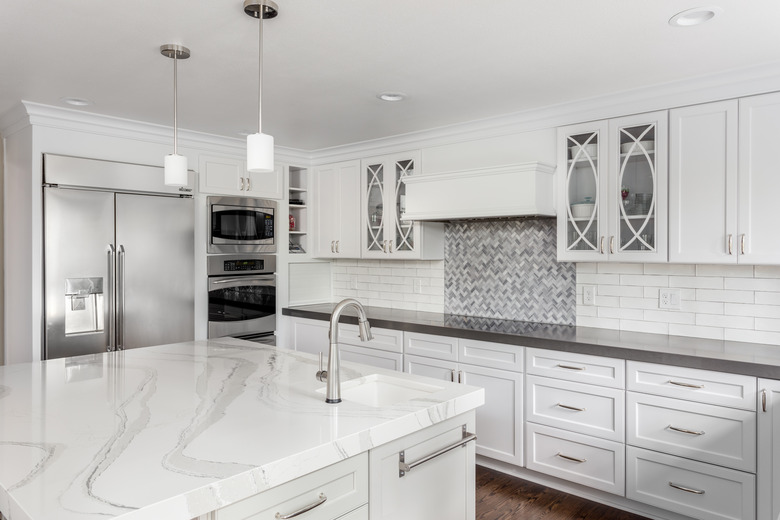Formica Vs. Quartz Countertop
We may receive a commission on purchases made from links.
When it comes to designing your perfect kitchen, choosing the right countertop is a big decision. The countertop will be the backbone of your kitchen and making sure it properly fits your needs is essential. You don't just want it to look good with your kitchen aesthetic — you also want to make sure it's suitable for your everyday needs. Choosing between Formica and quartz countertops can be tricky, so knowing the pros and cons of both can help you make a more informed decision.
Pros and Cons: Formica Countertops
Pros and Cons: Formica Countertops
Formica is a plastic laminate that can be applied over the top of cheaper materials to make an attractive countertop. It has a slightly retro reputation and can come in an array of fun patterns and colors. Formica countertops are generally thought of as more affordable than other materials at around $50 per 4 x 6-foot sheet.
According to Style Flooring, another big advantage of Formica is its durability. It's very watertight and thus impervious to most types of staining. Hanstone Quartz also points out that installing Formica countertops is easy and can be done without the help of a professional.
There are, of course, some downsides to Formica countertops. As Marble.com explains, the lower cost of Formica does tend to lead to a compromise on quality. Formica is less hard than other countertop materials and can be prone to scratching and chipping. The multiple layers can become scratched, revealing the material underneath. Formica is also less heat-resistant, meaning you'll have to be careful to use trivets when cooking.
Pros and Cons: Quartz Countertops
Pros and Cons: Quartz Countertops
Many see quartz countertops as the gold standard in terms of kitchen fittings. As Ideal Home explains, it's one of the most durable options for kitchen counters out there. It's scratch-resistant and can stand very high levels of heat. Quartz is also resistant to staining and water damage, particularly after it has been polished. Many also praise the look of a quartz countertop, which gives a kitchen a luxurious feel.
Nonetheless, there are some downsides to quartz. One drawback is its extremely high price tag. Quartz countertops are very expensive, costing around $10 per 2 x 4-inch piece. The price does work out to be more affordable over time, though. If correctly installed and maintained, quartz countertops won't need to be replaced.
The website Formica also points out that there are other significant downsides to quartz countertops. If you skimp on price, you may end up with a low-quality countertop that's prone to staining, chipping and scratching — possibly even more so than laminate.
Formica vs. Quartz Countertops
Formica vs. Quartz Countertops
There are obvious pros and cons to both Formica and quartz countertops. It all comes down to what you're looking for in your home. If you're looking for a less expensive countertop that will offer a good level of durability and many options in terms of design, Formica could be for you.
However, if you're willing to spend significantly more for a show-stopping countertop that will last a lifetime, quartz could be a better option. And don't forget, there are more choices out there than just these two. According to Countertop Guides, other options, like marble, slate, concrete and stainless steel, can offer different pros and cons and could be better suited to your needs.
